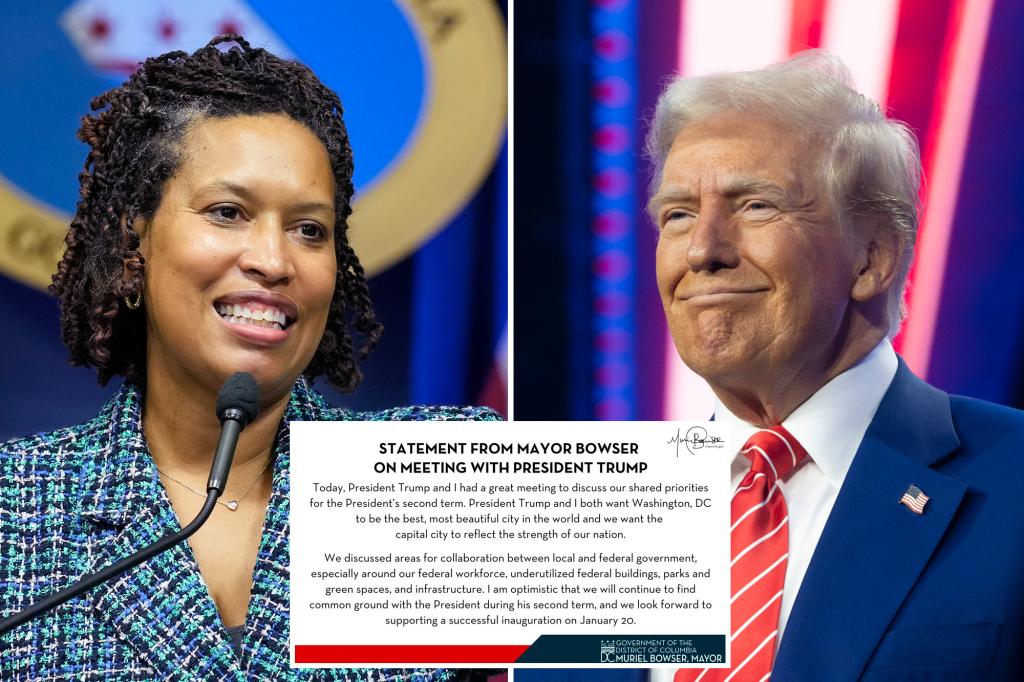The unexpected meeting between Washington, DC Mayor Muriel Bowser and President-elect Donald Trump signals a potential shift in their historically contentious relationship. Bowser, a three-term Democrat, and Trump, who has publicly criticized the city’s leadership and crime rates, met to discuss shared priorities for the President’s second term. Bowser’s statement following the meeting emphasized their mutual desire to make Washington, DC “the best, most beautiful city in the world,” reflecting the strength of the United States. This collaborative tone stands in stark contrast to Trump’s previous campaign rhetoric, where he threatened to “federalize” the district due to its high crime rates. The meeting suggests a willingness to put aside past disagreements and work together for the betterment of the nation’s capital.
The meeting’s agenda focused on potential collaboration between local and federal government entities. Key areas discussed included the federal workforce, the utilization of underused federal buildings, the improvement of parks and green spaces, and infrastructure development. Bowser expressed optimism about finding common ground with Trump during his second term and pledged support for a successful inauguration on January 20th. This focus on practical issues and collaborative efforts suggests a departure from the often-personal nature of their past interactions. The meeting represents a potential turning point in their relationship, prioritizing the city’s needs over political differences.
The apparent rapprochement between Bowser and Trump marks a significant departure from Trump’s previous pronouncements regarding the city. During his campaign, Trump repeatedly criticized Washington, DC, referring to it as a “dirty, crime-ridden death trap” and pledging to “take over” its administration. He argued that the federal government should assume control and implement tougher law enforcement measures to address the city’s crime problems. His strong rhetoric reflected a critical view of the city’s leadership and management, creating a tense relationship with Mayor Bowser.
Trump’s harsh critiques of Washington, DC were fueled by the city’s rising crime rates, particularly the 273 murders recorded in 2023, the highest number since 1997. This surge in violent crime prompted congressional intervention to block a proposed update to the city’s criminal code, which would have lowered penalties for certain violent offenses. The intervention underscored the national concern about the city’s crime situation and further fueled Trump’s calls for federal intervention. The crime rate, however, subsequently declined in 2024, with a 32% drop in murders and a 35% decrease in overall violent crime. This improvement may have contributed to the more conciliatory tone of the recent meeting.
The meeting between Bowser and Trump also highlights the complexities of the relationship between the federal government and the District of Columbia. As the nation’s capital, Washington, DC operates under a unique political structure, with limited autonomy compared to states. This has historically led to tensions between the city’s elected officials and the federal government, particularly concerning local control and budgetary matters. Trump’s earlier threats to “federalize” the city touched upon this sensitive issue, raising concerns about the potential erosion of local governance. The meeting, however, suggests a potential shift towards a more cooperative approach, focusing on shared responsibilities and collaborative solutions.
While Bowser’s statement expresses optimism about future collaboration, the long-term trajectory of their relationship remains uncertain. The stark contrast between Trump’s past rhetoric and the conciliatory tone of the meeting raises questions about the sincerity and sustainability of this newfound cooperation. Furthermore, the absence of comment from the Trump transition team leaves room for speculation about the President-elect’s true intentions. The meeting, while promising, represents a single point in a complex and often-contentious relationship. Only time will tell if this meeting marks a genuine turning point towards sustained collaboration or simply a temporary truce in their ongoing political engagement.

